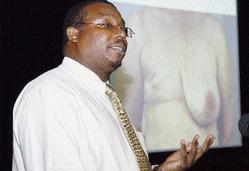Keisha Shakespeare-Blackmore and Yahneake Sterling, Staff Reporters

For women with breast cancer, one of the options is mastectomy. Here Dr. Derek Mitchell discusses the various treatments for breast cancer during a public forum at the Courtleigh Auditorium last Wednesday. - Peta-Gaye Clachar/Staff Photographer
For many decades, breast cancer has been the plague that haunts women around the world. And, as Breast Cancer Awareness Month comes to an end, most of the information throughout the month was focussed on the disease in women. An American study done in 2005, showed that less than one per cent of all breast cancer cases occur in men.
Breast cancer is a malignant tumour that develops from cells of the breast. Though the disease is very rare in men, the symptoms experienced by men are similar to those experienced by women. These include: a lump felt in the breast, nipple pain, an inverted nipple, nipple discharge (clear or bloody), sores on the nipple and areola (the small ring of colour around the centre of the nipple) and enlarged lymph nodes under the arm.
The process to diagnosed breast cancer in men, once an abnormality is detected, is the same as it is for women. These include: a mammogram, biopsy and an ultrasound. Surgery, radiation and chemotherapy are methods used to treat the disease in men.
Surgical oncologist, Dr. Derek Mitchell, told Flair that in his 21 years of practising medicine in Jamaica (17 as a surgeon) he has only encountered four cases of breast cancer in men. The approach to the disease, he notes, is the same for both sexes. However, less consideration is given to preserving the breast. "Men don't normally have breast tissue, so we do a mastectomy and remove a wide area, the nipple is sometimes removed," Dr. Mitchell pointed out.
While the mortality rate is not known for men, Dr. Mitchell believes that of the four cases that he encountered, at least two of the men are still alive.
Coping with Breast Cancer
At a breast cancer forum put on by the Jamaica Breast Cancer Society held at the Courtleigh Auditorium in Kingston last Wednesday, Dr. Jennifer Mamby-Alexander gave tips on how to cope with breast cancer.
Dr. Mamby-Alexander has battled breast cancer and has won the war. She notes, "Breast cancer is like a big bad wolf that comes to huff and puff to blow your body down, but remember you are in control."
She said that when coping with breast cancer, there are several things that you must do whether you are male or female.
Tell family members in private. Make sure to turn off phones, television, radio etc, get their undivided attention. Give them information in small chunks.
Have someone who knows and understands what you are going through to be there with you for support when you are telling them.
When explaining to children, be clear and direct and do not let them hear from others. Let children know they cannot catch it from you. Do not frighten them.
Tell your coworker, boss first then others based on the relationship you have with them and how much you value your privacy.
Try to understand your diagnosis, treatment plan, and your feelings about your status.
She also notes that there are several emotions that are experienced after you discover that you have breast cancer.
1. Denial: You will go through a period in which you just cannot accept that you have the disease.
2. Guilt: You blame yourself for not doing your mammogram and self-examination but remember it is never your fault.
3. Loneliness: Friends will visit at first, but after a while they stop inviting you and your spouse out and may distance themselves.
4. Depression: You will grieve over the fact that you are ill. You become stressed out; lose your appetite, weight, and sleep.
She advises that you have to accept the fact that you have a chronic disease like any other chronic disease thus you will not feel that special. It can happen to anyone. "Remember, from the first day you took your first breath you were already dying," she said.
Her remedy is that you need to vent your emotions, laugh, exercise, and find creative activities to be involved in.
Health & fitness

